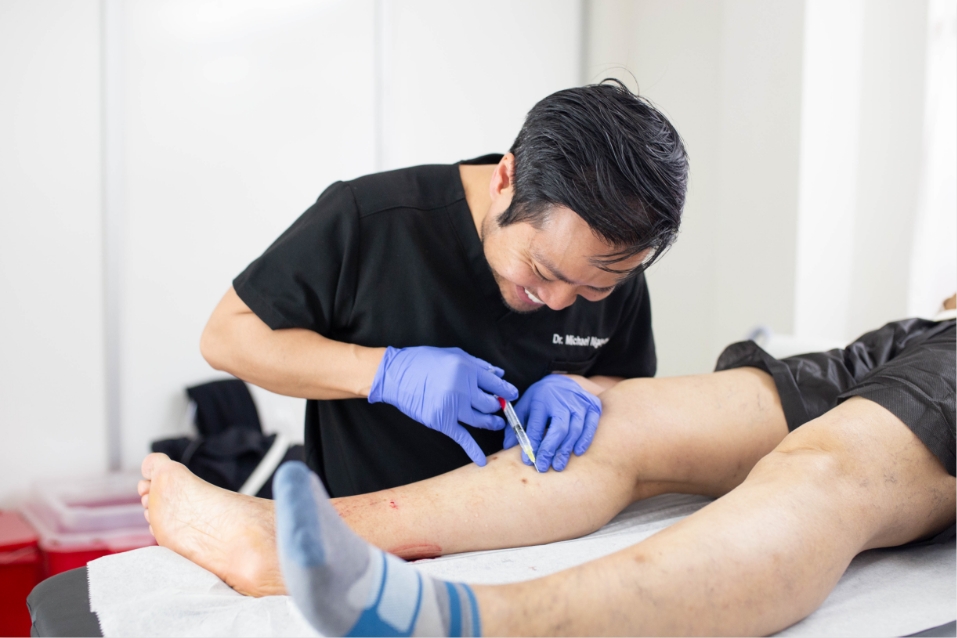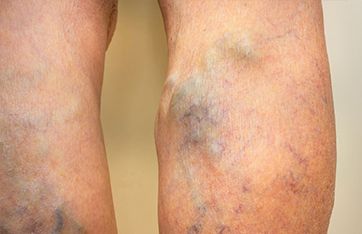If you have varicose veins, you may be nervous about getting them treated. We don’t blame you – there are a lot of scary stories out there about getting your defective veins surgically removed. However, there is a form of varicose vein treatment that is much better than surgery!
Minimally invasive vein treatment: Best form of varicose vein treatment in NY.
Minimally invasive treatment is a comfortable yet effective alternative to varicose vein surgery. While normal surgery involves slicing open your skin and physically removing the defective varicose vein, minimally invasive treatment at a vein clinic merely involves a single skin puncture – similar to an injection. Because this is a much simpler procedure, it has several advantages over varicose vein surgery:

- Minimally invasive treatment does not need general or spinal anesthesia – all you will need is a simple numbing injection.
- You do not need extensive laboratory tests before you undergo minimally invasive treatment.
- Minimally invasive treatment does not need hospital admissions – it can be done as an outpatient procedure in the doctor’s office. You only need to show up on the day of your appointment!
- You do not need to take time off work – the procedure does not require any ‘recovery’ period.

How do minimally invasive treatment options work?
To understand how minimally invasive treatment works, you must understand what causes varicose veins in the first place. Varicose veins form because of an underlying vein condition called chronic venous insufficiency (CVS), which affects larger veins of the leg, called the saphenous veins. In CVS, the saphenous veins fail to transport blood efficiently back to the heart, and as a result, the blood backs up and pools in the smaller leg veins. These smaller leg veins expand and distort, giving rise to the classic swollen, twisted appearance of varicose veins.
Minimally invasive treatment targets the defective saphenous veins. The vein doctor accesses these veins using a flexible catheter, through a small skin puncture. Through this catheter, the vein doctor can treat the veins from within. Usually the treatment aims at blocking up the veins entirely, so that blood can no longer flow through them. Once the route is blocked, an alternate, healthier vein takes over the blood transport, and it no longer pools in the smaller veins. This usually allows the varicose veins to heal and disappear over a period of time.
Which kinds of minimally invasive treatments are most preferred at a varicose vein treatment center?
There are different methods through which saphenous veins can be sealed off, and some techniques are definitely better than others. Here are some of the common methods preferred by varicose vein specialists in NYC:
- VenaSeal: This is the most preferred technique used by vein specialists, as it does not even need a numbing injection. Using a catheter, medicated glue is delivered in drops throughout the vein. The glue instantly hardens and seals off the vein.
- Radiofrequency ablation: This is the most commonly used technique. After a numbing injection, a radiofrequency catheter is inserted into the vein. Heat generated from radiofrequency waves cause the vein walls to melt, and then scar and seal off.
- Endovenous laser ablation: Instead of radiofrequency waves, laser energy is used to seal off the vein. This is less preferred by experienced vein specialists, as the intense laser energy can make the procedure uncomfortable.
- ClariVein: The catheter is equipped with a rotating head. A medicated solution (called sclerosant) is delivered through the catheter, and the head disperses it in all directions, throughout the vein. This solution causes the vein walls to become sticky and adhere to each other, sealing off the vein.
- Sclerotherapy and Varithena: These do not need a catheter and are reserved for the smaller residual veins that remain after the above procedures are done. Sclerotherapy, reserved for tiny spider veins, uses liquid sclerosant, while varithena uses foam based sclerosant, and is used for larger veins. In both cases, the solution is directly injected into the residual vein.
Top vein clinic for minimally invasive varicose vein treatment in NY: Vein Treatment Clinic
If you are looking for an experienced vein doctor in NYC for varicose vein treatment, look no further. The Vein Treatment Clinic, New York, is a premier varicose vein treatment center, where you can consult with highly experienced, board certified vein specialists. Our team of vein doctors include:
- Dr. Juan Montoya: A highly experienced surgeon who trained at Yale
- Dr. Sareh Rajaee: A vascular surgeon with years of experience treating vein and arterial disease.
All our vein doctors offer advanced, minimally invasive treatment options for both varicose veins and spider veins.
Our vein clinic in NY is located in Midtown, and is easily accessible from several subway lines, as well as Penn Station. We are located very close to the Empire State Building. If you would like to schedule a consultation with one of our vein experts at this location, you can book an appointment online, or call 646-846-1057.
To learn more about the different options for spider and varicose vein treatment, please visit https://www.veintreatmentclinic.com/vein-treatment/. Our accredited vein centers offer all of the latest technology, and our accomplished and compassionate vein experts will create a custom treatment plan tailored to your individual needs. We have locations in New York, Long Island, New Jersey, California, and Texas.








